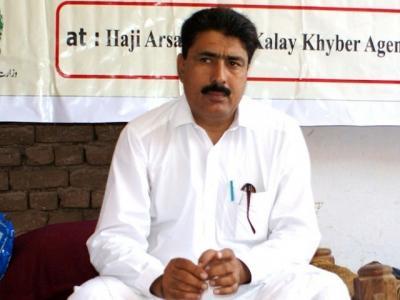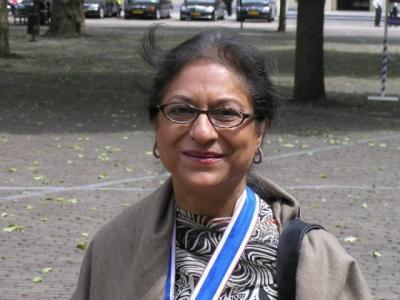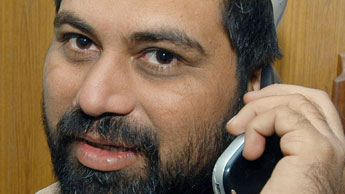Al Libi’s gone and Pakistan blasts perfidious foreigners bumping off perfidious foreigners on sovereign soil
A US drone strike on Monday targeted al Qaeda’s No. 2 Abu Yahya al Libi in Pakistan’s lawless North Waziristan.
Targeted killings of Islamist militants can be a tricky thing. I can’t count the number of times I’ve had to resurrect cold dead Islamist militants in Pakistan. I simply call it the Lazarus syndrome.
To be fair, the Lazarus syndrome is not exclusive to Pakistan. I’ve encountered it in Nigeria too, where I profiled “The Boko Haram terror chief who came back from the dead”.
But this time, I believe they got al Libi. Why? Because US officials took a day to confirm it and a senior Pakistani Taliban leader told Reuters that the killing of al Libi in a US drone strike was a “big loss”. Nothing like a militant confirming the assassination of a fellow jihadist brother in arms.

Now, whenever there’s a drone strike anywhere in Pakistan – including the areas the government barely controls – you can be sure that Pakistani officials will condemn the strike.
And so they did – because some things never change.
Deputy US Ambassador to Pakistan Richard Hoagland was summoned to the Pakistani Foreign Ministry on Tuesday and read the condemnation and “violation of Pakistan's sovereignty'' act.
Now there’s one less nasty guy on sovereign Pakistani territory. And you know al Libi was not a lowbrow nasty – he urged hapless Somalis to attack African Union troops, he called for attacks in Europe in revenge for the Danish cartoons of the Prophet Muhammad, he...I could go on, but you get the picture. Or just read this May 2008 New York Times article.
‘CIA doctor’ and little guys get the rap
So, in many ways, official Pakistani criticism of the al Libi strikes is similar to the condemnation of last year’s raid in Abbottabad, that got bin Laden – right under the nose of Pakistan’s all-powerful military-intelligence honchos.
That pissed off the military-intelligence establishment so thoroughly, they arrested the Pakistani doctor who allegedly helped confirm bin Laden’s presence in that Abbottabad haveli to the CIA, earning him the moniker “CIA doctor” in his homeland.

Needless to say, the CIA is a nasty term in Pakistan – as it is in most countries. So, being accused of helping the CIA is not an endearment in this vociferously US-hating nation. Of course senior Pakistani officials – including ISI big guns – cooperate with the CIA, but never mind.
The Pakistani doctor must have been paid by the CIA, but it’s probably a lot less than the US military aid to the Pakistani military-intelligence establishment. As I said, never mind.
In Pakistan – as in all too many countries – the little guys get the rap.
And so Dr. Shakeel Afridi was sentenced last month to 33 years in jail after he was found guilty of treason under Pakistan's archaic system of tribal justice.
Leading activists says Pakistani intelligence plotted her assassination
Now one of the Pakistani human rights activists who expressed concern over the denial of due process to Dr. Afridi was Asma Jahangir, one of the country’s most distinguished human rights activists and a household name in Pakistan.

A Pakistani Supreme Court advocate, Jahangir has, at various times, served as the UN Special Rapporteur on Religious Freedom, the UN Special Rapporteur on Extrajudicial and Summary Executions, the head of the Human Rights Commission of Pakistan, and president of the Supreme Court Bar Association of Pakistan.
When it comes to my personal list of top 10 brave women, Jahangir is up there. She’s been imprisoned in former Pakistani military dictator Gen. Zia ul-Haq’s jails and she’s faced death threats aplenty for some of her high profile cases – including defending a Christian accused of blasphemy and an infamous honor killing case.
One of her new clients is Pakistan's former ambassador to the US, Husain Haqqani, who is accused of being behind a mysterious memo that sought US help to stave off a coup in Pakistan, a charge Haqqani denies.
Jahangir is no stranger to death threats from Islamist extremists and she’s not one to unnecessarily play up a threat. So, imagine the shock when one of the country’s best-known lawyers publicly reveals that she has received information that the security establishment is planning to carry out a "murderous attack" on her.
According to Jahangir, “a credible source” informed her about a "murderous attack" planned on her by state agencies, following which she had restricted her movements and decided to remain at home.
She contended that the plan to kill her had been hatched at the "highest level" of state agencies, which were apparently angered by her efforts to highlight human rights violations by security forces in the restive province of Baluchistan.
Allegations of Pakistan’s shadowy military-intelligence complex targeting Pakistani civilians are not new.
They came to the forefront last year when the body of Pakistani journalist Saleem Shahzad was found dumped in the plush, highly secured F-6/2 neighborhood of Islamabad. The military establishment – darkly known as “deep state in Pakistan – was widely believed to be responsible.

In an interview with the German international broadcaster Deutsche Welle, Jahangir was asked if she thought “the ISI and other security agencies could kill an internationally renowned person like yourself?”
I’m going to quote her reply: “Let me remind you of our history. Prominent people have been killed in Pakistan just like in any other country. The difference between Pakistan and other countries is that in Pakistan nobody ever knows who is responsible for these murders.”
In a country where the military-intelligence establishment is widely believed to bump off law-abiding but troublesome citizens, it’s not the person killed that matters as much as who’s done it.
If it happens to be the so-called “deep state” or militant groups aided or abetted by the omnipotent security network, it’s A-okay – it’s a home crowd after all, not those perfidious foreigners taking off other perfidious foreigners in our sovereign, un-administered land.




0 Comments
Post new comment